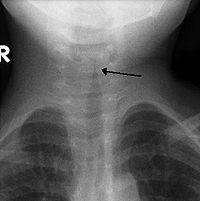
Photo from wikipedia
Obstructive sleep apnoea (OSA) is a common sleep disorder and is associated with a number of comorbid conditions, including the frequent occurrence of depression. Notably, there is a considerate overlap… Click to show full abstract
Obstructive sleep apnoea (OSA) is a common sleep disorder and is associated with a number of comorbid conditions, including the frequent occurrence of depression. Notably, there is a considerate overlap in day- as well as night-time symptomatology in depression and OSA. In light of this, we aimed to disentangle the distinct effects of OSA and depression severity on day- and night-time symptomatology. This pilot study (N = 320) utilized a retrospective chart review design and included both males and females who met the minimum diagnostic criteria for OSA. Daytime symptoms (sleepiness and fatigue) were assessed via questionnaires, while night-time symptoms were measured via polysomnography. Main findings include the following: (a) no association between OSA and depression severity, (b) depression severity significantly predicted increased sleepiness and fatigue (c) OSA severity significantly predicted increased stage 2 non-rapid eye movement sleep percentage, (d) OSA significantly predicted decreased stage 3 non-rapid eye movement sleep percentage and rapid eye movement sleep percentage. Overall, depression severity exerts the strongest influence on daytime symptomatology, while OSA severity exerts the strongest influence on night-time symptomatology. Moreover, with the exception of sleepiness, no overlap between day- and night-time findings was detected. OSA and depression, although comorbid, possibly constitute distinct disease processes in this population group. Consequently, solely devising treatment targeting a reduction in apnoea-hypopnoea index might not be sufficient in alleviating debilitating daytime symptoms in treatment-seeking individuals.
Journal Title: Sleep and Breathing
Year Published: 2019
Link to full text (if available)
Share on Social Media: Sign Up to like & get
recommendations!